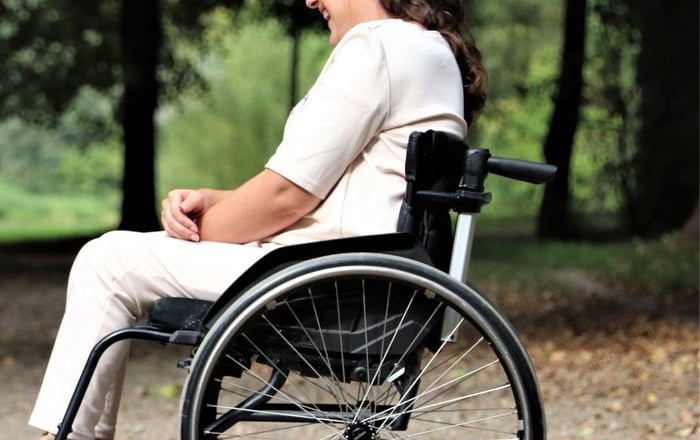Does Medicare Cover Walkers? A Guide on Canada vs. U.S.A Rules
Did you know that in 2017, 20% of Canadians aged 15 years and older had a mobility disability? That's about 6.2 million people with problems restricting their daily activities!
No wonder that mobility issues are now the third leading cause of disability in the country. And for those who suffer from mobility impairments, the need for an assistive device is often a must.
The good news is quality walking canes aren't that expensive—some cost even less than $20. Walkers and rollators, however, can cost several hundred dollars.
This has led to many disabled individuals wondering, "Does Medicare cover walkers?" and "Do the Medicare rules for mobility assistive device coverage in the U.S. apply to Canadians?".
That’s exactly what we’ll look into and answer in this post, so be sure to keep reading!
Does Medicare Cover Walkers in the United States?
Yes, Medicare does pay for walkers and rollators medically-required by mobility-impaired Americans. This means that the walker should be necessary to help a patient cope with a long-term disability. Also, a doctor should have prescribed the need for the walking assistive device.
For Americans, it's the Medicare Part B (Medical Insurance) that pays for the cost of walkers. Both walkers and rollators fall under Medicare’s durable medical equipment (DME) coverage.
Other Eligibility Requirements
Medicare in the U.S. will only pay for DME if both the doctor and the DME supplier is Medicare-enrolled. Otherwise, it won't pay or reimburse the claims for the device, whether it's a walker, rollator, or cane.
Aside from enrollment, the DME supplier should also be participating in Medicare. If it is, then it should accept the assignment for the device. Even with enrollment, non-participating suppliers have the option not to accept the assignment.
The Amount of Coverage
Walkers covered by Medicare and accepted by suppliers in the U.S. get 80% coverage. The remaining 20% is either out-of-pocket or covered by other insurance plans. There are also deductibles that apply under Medicare Part B.
Medicare also covers repairs to walking assistive devices already owned by an individual. However, the replacement parts should come from a Medicare-approved supplier.
What About in Canada?
So, how about in Canada? Are walkers covered by Medicare too?
This depends on the publicly funded health care system that you’re a part of. Some provinces provide some level of coverage for mobility aids and devices while some don’t.
There are also many requirements and limitations for the coverage. Moreover, the rules that apply vary across the provinces and territories.
Alberta Health Care Insurance Plan (AHCIP)
Albertans who are part of the Alberta Aids to Daily Living (AADL) program can get coverage for walkers. AADL pays for 75% of the benefit cost with a yearly cap of $500 per person or household.
British Columbia Medical Services Plan (MSP)
The BC MSP does not provide coverage for medical equipment such as walkers. There are programs, however, that can provide medical equipment to qualifying individuals.
The Employment and Assistance Regulation is one such program. Qualified persons can receive funding for walkers, canes, crutches, and other mobility aids.
Manitoba Health Plan (MHP)
The Manitoba Health Plan doesn't provide coverage for walkers. The Employment and Income Assistance may help pay for the costs though.
New Brunswick Medicare
Under the New Brunswick Medicare, walkers, crutches, and other DME aren’t covered.
Newfoundland and Labrador Medical Care Plan (MCP)
The MCP may not cover walkers, wheelchairs, and other durable medical equipment. Low-income seniors may receive financial aid through the Special Assistance Program though. Qualified seniors can get the funds they need for walkers or wheelchairs.
Northwest Territories Health Care Plan
Under the NWT Health Care Plan, medical supplies are "extended health benefits". In other words, walking aids like walkers and crutches are not covered. To get financial aid for such equipment, seniors can apply for the Senior's Program.
Nova Scotia Medical Services Insurance Program (MSI)
Durable medical equipment, such as crutches and wheelchairs, aren't covered by the MSI.
Nunavut Health Care Plan
Under the Nunavut Health Care Plan, medical supplies and equipment aren't covered. The territory's residents can apply for the Non-Insured Health Benefits (NHIB) program though.
The NHIB program provides full coverage for medical equipment and appliances. One requirement is that devices should come from approved service providers and suppliers.
Ontario Health Insurance Plan (OHIP) Coverage
Ontario’s Assistive Devices Program (ADP) pays up to 75% of the cost of the walker. You then pay the 25% deficit. ADP, however, also allows private insurance to cover the remainder of the cost.
To qualify for ADP’s coverage, the patient's disability should be chronic (six months or longer). If the need is only for sports or work, ADP will not provide coverage.
Quebec Health Insurance Plan
The Quebec Health Insurance Plan provides coverage for walking aids, including walkers. It also covers crutches, canes, and standard and wheeled walking frames. Moreover, the health plan covers locomotion aids, including wheelchairs and transport chairs.
The QHIP does require that the need for the walking aid is on a daily basis and has to be for at least one year.
Prince Edward Island Health Plan
Under the PEI Health plan, walkers and crutches are not covered. The good news is the government program called “AccessAbility Supports” can help. Qualified individuals can receive assistance for their walking aids.
Saskatchewan Health Coverage
Saskatchewan Health itself doesn't provide coverage for mobility aids. It does, however, offer a loan program for walkers and wheelchairs. This is through the Saskatchewan Aids to Independent Living (SAIL) Program.
Accessing Quality Walking Aids for Less
As you can see, the answer to the question "Does Medicare cover walkers?" depends on where you are. If you are in Quebec, good for you. You'll get full coverage so long as you fulfill all requirements.
Don't worry though, even if your public health plan doesn't cover walkers, it's likely that you can get coverage for a walker or a rollator if you have private insurance. Just make sure that you invest in quality walking or mobility aids so that they'll last you for a long time.
Ready to get yourself a quality, yet affordable walker? Then please feel free to browse our extensive collection of mobility assistive devices!










